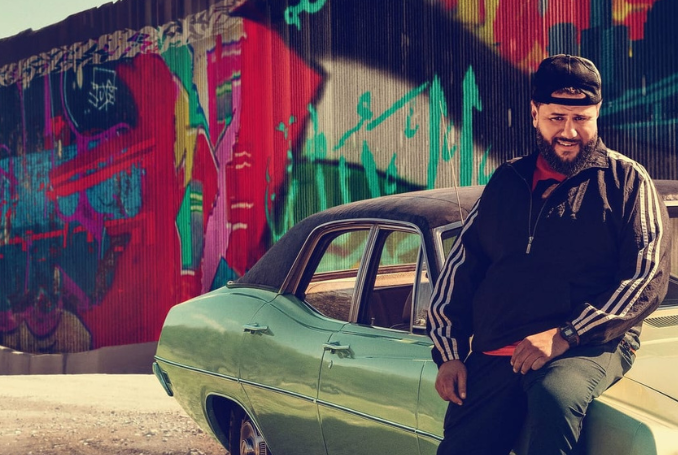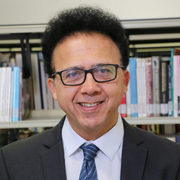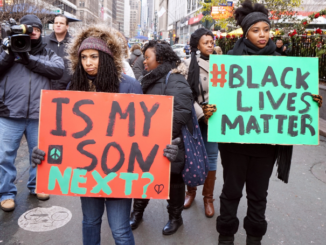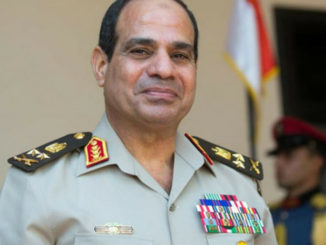
By Jamil Khader
Everybody loves Mo, Netflix’s tragi-comic series created by Mo(hammed) Amer and Ramy Yousef. Palestinian commentators love it for putting Palestine back at the center of mainstream American popular culture. Mo not only defies the taboos on uttering the P-word (Palestine), but it also alludes to the Zionist settler-colonial occupation of Palestine and its ethnic cleansing project that culminated in the 1948 Nakba.
In the atmospherics of anti-Palestinian racism that is sweeping the Western world and the Ongoing Nakba in Palestine, the mere existence of Palestinians, even the two-state solution, is now considered an expression of their anti-Semitism.
Moreover, liberal pundits find Mo enchanting, because the asylee protagonist’s struggles with a broken asylum system, unemployment, or unemployability, addiction, health insurance, crime, etc., speak to the experiences of different American communities. It thus conveys a universal message about precarity and statelessness and reflects a sense of solidarity between different underrepresented communities.
On their part, leftist analysts fawn over Mo, because it subverts mainstream Western Islamophobic representations of the Arab terrorist and Muslim fanatic. In the context of the rise of authoritarian capitalism, and what pundits call fascism or semi-fascism that is sweeping the United States, Mo humanizes the Palestinian and Muslim Other, making it possible for viewers to sympathize and identify with the characters. Indeed, Mo Najjar, Mo Amer’s alter-ego, is a relatable character, because his experience is grounded in his childhood trauma and guilt at the death of his father and his overwhelming feeling of castration and lack that makes him fail to provide for his family.
By fighting anti-Palestinian racism and Islamophobia, Mo can be associated with the tradition of egalitarian comedy. While ideological comedy works to sustain and justify the social order, egalitarian comedy criticizes the dominant social order and utters the unsayable and impermissible within the consensual parameters of public discourse.
However, the series packages its presumably radical message in an exclusively politically correct liberal discourse, in a way that cancels out the egalitarian power of laughter and comedy. A true egalitarian comedy, as scholars of comedy show, reveals that our common notions of social reality and identity are neither coherent nor whole, but are rent apart by deeper antagonisms and contradictions that cannot be easily resolved.
Although Mo Amer creates the character Mo Najjar as an alter-ego that allows him to make fun of himself and his naiveté, Mo does not go all the way in actualizing this egalitarian message. The series betrays this message in its take on Palestinian cultural identity, Islam, and the Palestinian struggle for freedom.
Olive Oil in the “Salad Bowl”
Contrary to egalitarian comedy, Mo essentializes cultural identity and locks itself in the prison of identity politics that grounds different modes of being, the way Palestinians or Muslims enact their identities, in coherent notions of wholeness, roots and cultural traditions. Obviously, this unequivocal assertion of Palestinian identity could be a function of the Najjar’s sense of loss and experiences of dislocation.
Some commentators found this celebration of Palestinian and Muslim identity refreshing. They point out that the series features “an unapologetically Palestinian character,” someone who “unashamedly embraces his roots.” Indeed, Mo prefers to describe himself as a “salad bowl,” even though his co-creator Rami Yousef opts for the more antiquated trope of the “melting pot” to refer to his partner. Mo seamlessly crosses borders of languages and cultures, has a black Nigerian friend, and is dating the Mexican Maria.
Within the neoliberal “salad bowl” ideology of the show, Palestinian particularity is elevated through the three traditional F’s of multicultural America: food, fabrics, and festivities. Hummus and olive oil function as the major symbols of Palestinian identity in the mosaic of American multiculturalism. Mo carries a bottle of Palestinian olive oil with him everywhere. In the first scene in his relative’s hookah lounge, Mo uses olive oil to make his hummus more authentic. It is “in his blood,” as he says.
Olive oil is used not only for its culinary superiority but also for its medicinal and ritualistic qualities. It even takes on another level of existential meaning: It becomes a symbol that anchors and stitches his personal narrative.
Moreover, the series uses the conventions of incongruity to take pride in Palestinian heritage and particular identity. When the store sales associate tries to offer him chocolate hummus, Mo retorts that she has just offended his grandmother. Then, to the amazement of the store employee, he whips out his olive oil bottle and drizzles olive oil on the hummus. In addition, Mo is frequently seen with his kaffiyeh over his shoulders and there is also an Arab wedding.
Hence, Mo is structured as a movement from exclusion and statelessness to integration into the privileges of citizenship and the American multicultural landscape. As Mo Amer said in one interview about the refugees and asylum-seekers, “All a person like that wants is to feel like he belongs, and feel like they’re seen, and feel like they’re equal to their other human counterparts.” In this sense, the series uses the conventions of comic relief to expose the problems with American myths about exceptionalism, democracy, and equality but not to dismantle them.
As such, the asylee’s excessive presence is ultimately neutralized and incorporated into mainstream culture. No wonder, towards the finale of the series, olive oil, the iconic symbol of Palestinian identity, becomes another commodity for circulation in the global capitalist market. The mother decides to start her own olive oil business and Mo decides to help her, by making a deal with the olive farm owner to set up an olive oil refinery for his mother. The irony of it all is that Palestinians are reclaiming this iconic symbol of Palestinian identity in Texas as refugees “picking olives with immigrants.”
However, the series presents Palestinian identity as Muslim to the exclusion of Palestinian Christians from the official narrative of Palestinian identity. More importantly, there are missed opportunities in Mo that could have turned this take on identity politics into a true egalitarian discourse that recognizes the void and divisions within our identities. For example, Mo is usually mistaken for a Mexican by Mexican and Black gangs. There is a moment here for him to recognize the void at the core of identity and the impossibility of essentializing any identity in any singular shape or form. Nevertheless, Mo insists on falling back on his identity, reproducing and reaffirming it.
“Mohammed Walks into a Church”: The Limits of Muslim Laughter
Mo also subverts egalitarian comedy, by essentializing Islamic identity and refraining from criticizing the Islamic faith. For the show’s co-creators, Islam as a religion has a clear identity. They discuss what they call the “basic Muslim package” in very essentialist terms, including the “oud, prayer beads, and maybe a traveling [prayer] rug” as if these objects define the essence of who or what a Muslim is.
Like other Muslim comedians, Mo draws on the conventions of incongruity in comedy to (lovingly) mock the everyday practices and paradiastolic hypocrisy of Muslims. For example, the mother justifies using a tequila bottle to package her olive oil under the pretense that she cleansed it in a way that removes the haram and turns it into halal. It turns their vice into a virtue and thus refuses to condemn them for these practices.
Moreover, when Mo and his siblings pray at their father’s grave, they seem totally clueless about what they are saying—the sister asks God to give her dead father health and vigor (a’afiya in Arabic). Needless to mention, Mo’s pre-marital sexual relationship with Maria contradicts the tenets of Islam. These cases of incongruity show that the younger generations of diasporic Muslims do not know much about their religion, but it is all the same.
More problematically, however, Mo uses the conventions of superiority in comedy to question the tenets of Christianity and convince Maria to wear the hijab. While Mo shies away from criticizing Islam as a religion, it questions Christian beliefs and dismisses them. These strategies imply that Islam is a more superior religion than Christianity. In the confession scene, for example, Mo is willing to dismiss the absurdity of Christian beliefs, but he is not willing in that scene or anywhere else in the series, to question his own faith. Hence, the “Jesus was Palestinian” statement, and the direct link Mo Najjar (Arabic for carpenter) establishes with Jesus, does not make the scene funny.
It is sufficient to compare the ideological work of comedy in the confession scene with the infamous confession scene in Seinfeld. Despite Jerry Seinfeld’s Zionist commitments and his participation in an anti-terrorist fantasy camp in an illegal settlement in the West Bank years later, Seinfeld mocks Christian hypocrisy but shows divisions in Judaic beliefs themselves. In the confession scene, Jerry complains to the priest that the dentist Tim Whatley converted to Judaism for the jokes. In response to the priest’s question of whether this offends him as a Jewish person, Jerry responds that it offends him as a comedian.
These thwarted expectations render the scene hilarious. Seinfeld mocks Christian hypocritical practices, while showing divisions in Judaic beliefs. Indeed, the series makes these contradictions central to Jewish life in the United States. For example, in the bar mitzvah scene, Mr. Lippman’s son Adam, believing he is a man, French kisses Elaine. When Elaine meets the boy after the ceremony and tries to explain how inappropriate his behavior was, the boy is outraged by the father’s lie that he was already a man and renounces his Judaism.
Needless to mention, Seinfeld unsettles liberal sensibilities, by toying with various Nazi motifs, including impersonating White supremacist Nazi leaders. Seinfeld even mocks Schindler’s List as well as the excessive abuse of anti-Semitism in some Jewish circles, the way his uncle Leo does when he attributes any inconvenience in his life to anti-Semitic hatred.
The problems with Mo’s confession scene notwithstanding, it is ironic that this confession allows Mo to work through and open up about his repressed traumatic childhood and his guilt over his father’s death. At that moment, he reaches the epiphany that his attempts to provide for his family failed all along—that his family had seen through his masculine sham from the beginning.
Furthermore, Mo’s attempt to convince Maria to wear the hijab is framed within the conventions of superiority. He keeps trying to persuade her to wear the hijab, because “nuns wear the hijab and they are not basic.” He also keeps lying to his mother that Maria is about to convert to Islam anytime soon. Hence, the mother is displeased about their relationship and complains to his pearl-clutching aunts that Mo is dating a Christian. Ironically, Mo’s sister Nadia is married to a White Canadian man and she does not wear a hijab either. Mo merely witnesses to Maria, in a way that shows that faith remains a stumbling block in his “salad bowl” ideology.
In short, Mo is embedded in liberal taboos about Muslims and Islam in a way that reflects liberal patronizing attitudes towards Muslims. For Netflix, Islam and Muslims cannot be criticized, since they are perceived to be under attack, making them beyond criticism, even though the Islamicate world is full of debates about faith, revelation, and the prophet.
It is as if Netflix, in an attempt to atone for the barrage of criticism it received for airing the Spanish series Elite, decided to air the polar extreme representation of Islam and Muslims.
Branding Palestine in the Age of Global Empire
Finally, the series undermines its egalitarian message, by reducing political antagonisms to mere friendly banter and branding issues. From the beginning, the series represents Palestinian-Jewish relationships in the US as an amicable banter between friends. In his shisha lounge, Mo’s uncle plays backgammon with his Zionist Jewish friend and they passionately argue about the Palestinian struggle for freedom. When Mo shows up, he tries to shut the debate down, calling them Arafat and Rabin. Moreover, the Zionist Jewish friend is considered part of the family as he participates in their family celebrations.
Interestingly enough, some Palestinian and Jewish commenters had mixed feelings about this lounge scene and accused Mo of spreading propaganda, Zionist and Palestinian, respectively. Palestinian commentators lambasted it for serving as a tool for Zionist propaganda, while the latter disliked it for referring to Palestine instead of Israel and for claiming that hummus is a Palestinian dish. Although the Jewish pundits did not appropriate hummus and declare it an Israeli dish, they suggested that hummus has Egyptian origins. Nonetheless, these Jewish commentators still expressed their appreciation for the way the series handles the so-called “Israeli-Palestinian conflict.”
These critics miss or downplay poignant political commentary in this scene, which could be interpreted as a sarcastic statement on the failed post-Oslo peace negotiations. There is a lot of shouting and screaming going on, but little to no results. In general, furthermore, the series does not refer to the “conflict,” but rather makes several allusions to the Nakba, the Zionist destruction of Palestinian homes, and the expulsion of Palestinians from their homeland. At one point, Mo even refers to the Intifada, by comparing an arcade game to “throwing rocks, [which] Palestinians should be the best at . . ..”
Nonetheless, the conflation of Jews with Zionists in the series is unsettling. Not all Jews or Israeli Jews are Zionists and many Jews around the world are anti-Zionists who are critical of Israel’s apartheid politics and the Zionist settler-colonial project. Moreover, Zionism is not “the only possible way to be properly Jewish,” the way Islam is not the only possible way for Palestinians to actualize their subjectivity. To suggest as much “ironically grounds Zionism in an antisemitic premise.” In fact, Israel has also detained and deported Jewish activists who are critical of Israel and launched a vicious attack against Jewish Holocaust survivor and philanthropist George Soros for supporting leftist group critical of Israeli policies.
Moreover, the “salad bowl” ideology of the show’s co-creators turns deeper antagonisms into a mere resolvable conflict between friends. Everyone relates to the other at the human level. They see themselves mirrored in each other—in their foods, pastime, and festivities, making it impossible for them to acknowledge any atrocities committed in the name of the Zionist settler-colonial project in Palestine. Hence, Mo can easily replace his Palestinian lawyer with a Jewish immigration attorney, even though, as the show implies, Palestinians should stick together against all odds.
This might explain Mo’s tepid reaction to those who greet him with “Shalom” and refer to Israel, when they know that he is Palestinian. For him, it becomes a “branding issue.” The show recognizes that Israel controls the narrative, propaganda tools, and marketing strategies that frame the Palestinian struggle for freedom in mainstream and popular culture. Nevertheless, it still codes this struggle in the language of business and commerce.
The show co-creators are definitely not naïve about the way the entertainment industry works and its ability to reabsorb the most radical messages into its capitalist circuits of exchange. Nonetheless, the relationship between the uncle and his Zionist Jewish friend could have been represented in new imaginative ways that audiences could have related to differently. Instead of engaging in juvenile “finger-banging” gestures, as Mo likes to do, the friends could have re-told racist jokes in non-racist, obscene ways not about each other, but each about himself and his own culture. This could have created a space for respect for and shared solidarity between these characters and the audiences.
Mo not only offers a tepid response to the Palestinian struggle for freedom, but it also obscures the role of the U.S. empire and the global capitalist system in destabilizing the Middle East. As a refugee and asylee narrative, the series ironically erases the totality of the situation that has engendered the human tragedy in which Mo’s story unfolds.
Towards the end of the series, when Mo attempts to smuggle himself from Mexico back into the U.S., a clear link is made between the Mexico-U.S. border wall and the annexation and separation apartheid wall that Israel built on Palestinian territory. If anything, these apartheid walls are symptomatic of the increasing polarization of wealth in the global apartheid regime, in which the haves live in segregated gated communities away from the haves-not.
While some commenters on social media did not find the show funny, the show has its funny moments, but the moments of egalitarian comedy in it are far and in between. Mo does not present any moment for the audience to cringe at the material, confront their own implicit assumptions and prejudices, and question whether they should laugh at the joke. If there is another season of Mo, it should certainly aim at making audiences think twice before laughing.

– Professor Jamil Khader is Dean of Research at Bethlehem University, Professor of English, and Editor at The Bethlehem University Journal. He contributed this article to The Palestine Chronicle.







